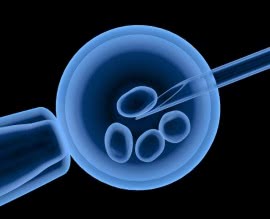Is bed rest necessary after IVF?
WHAT IS IVF?
IVF stands for “in vitro fertilisation” and is one of several methods available for people with fertility problems to help them become pregnant.
During IVF treatment, an egg is removed from the women’s ovaries and is then fertilised in a laboratory. After fertilisation, the egg, known as an embryo, is then returned to the woman's body to grow and develop, eventually resulting in pregnancy.
This procedure can be done using your eggs and your partner’s sperm, or eggs and sperm from a donor. [1]
DO YOU NEED BED REST AFTER AN EMBRYO TRANSFER?
In short, no – bed rest is not needed after an embryo transfer. Although bed rest has traditionally been recommended for women after any medical procedure.
Saying this, it’s still important to note that the first 24-hours are probably the most crucial as it’s within this timeframe that the inserted embryo has to attach to the uterine wall before it can fully implant. This can take a few days to happen, so it’s generally advised that you stay at home and relax for the first day or two to ensure that everything goes smoothly.
In the early days of IVF, women were told to stay in bed for the first two weeks after an embryo transfer. Interestingly, it was advised that they shouldn’t even stand up for a considerable amount of time afterward. Subsequently, they would have to use a bedpan when needed instead of going to the toilet.
These days, research and evidence have shown that full bed rest for this amount of time after IVF isn’t necessary and can actually be detrimental to your health. For instance, after delivery of a baby, women were prescribed 6 weeks of bed rest until it was later proven that inactivity increased their risk of DVT (blood clots in the deep veins). [2]

WHAT DOES RESEARCH SUGGEST?
Now that we know that bed rest isn’t necessary after an embryo transfer, here are some interesting findings from research on embryo transfers and bed rest:
-
A study carried out in 1997 demonstrated that even a 24-hour bed rest didn’t produce any better results than a 20-minute rest period.
-
Later in 2005, researchers determined that there was no difference in pregnancy rates between groups of women who got up immediately after an embryo transfer and those who rested an hour after an embryo transfer.
-
Finally, a scientific review published in 2011 outlined various studies regarding bed rest and embryo transfer. The authors concluded that there wasn’t enough evidence to support the use of bed rest following IVF or embryo transfer procedures. [3]
So, to summarise, why don’t you need bed rest after an embryo transfer? Simply put, the main reason it isn’t needed is that inactivity combined with high levels of estrogen can promote blood clots as well as a rise in insulin resistance. These blood clots can impede blood flow critical to embryonic and foetal development. [2]
ACTIVITY AFTER IVF
Whilst you shouldn’t be totally inactive and bed-bound, you should still take it easy for a while as implantation usually takes place three to five days after an embryo transfer. Once pregnancy has been confirmed, you can usually return to your normal routine.
Doctors agree that you should avoid high-impact workouts such as weightlifting, running, interval training, or other heavy activities during fertility treatments as it will redirect blood circulation to the muscles instead of to the uterus, ovaries, and eggs.
Instead, you should be doing exercise that is light and moderate in intensity for short periods of time such as yoga, walking, or swimming. [4]
If you’re having trouble conceiving and may need treatment, click here to get in touch with us to start your IVF journey today.
SOURCES:
[2] Do You Really Need Bed Rest After an Embryo Transfer? (cnyfertility.com)
[3] Do You Need Bed Rest After An Embryo Transfer? - ELITE IVF - Global IVF Clinic (elite-ivf.com)
[4] 5 Guidelines For Exercise And Fertility Treatments | Carolinas Fertility Institute














